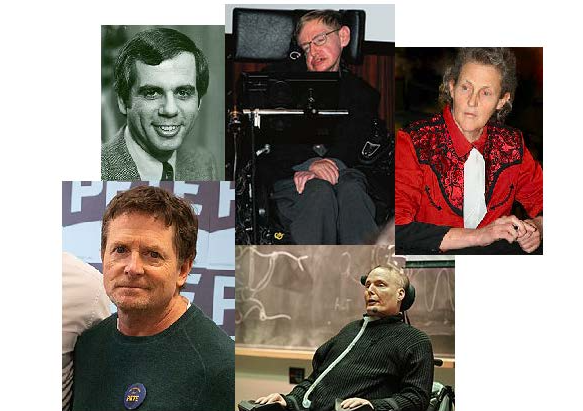Why do some advocates insist that severe autism is “shameful,” “undignified” and “embarrassing”?
There’s nothing shameful in suffering from neurological disability, just ask (clockwise from top left) Tony Coelho, Stephen Hawking, Temple Grandin, Christopher Reeve, and Michael J Fox. (Images: Wikipedia.)
By Jill Escher
Let me ask you this. Is is shameful for actor Michael J Fox to discuss his tremors? When Representative Tony Coehlo testified in front of Congress as he advocated for passage of the ADA, was it undignified of him to describe his uncontrollable seizures? When physicist Stephen Hawking discussed his struggles with ALS, were those details embarrassing? When actor Christopher Reeve showed the world his wheelchair and ventilator, was that humiliating? When animal scientist Temple Grandin talks about her sensory overload, do we get all squeamish?
The answer is obvious: no, no, no, no, and no. All those cases involve debilitating neurological disability. How can there be shame or embarrassment in involuntary actions growing out of foibles inside a faltering biology?
Then why, please tell me, do neurodiversity activists carve out severe autism as a disability so singularly despicable that its particulars must be banished from the public sphere?
This #AutismAction Month, we at NCSA are devoted to spreading #AuthenticAwareness about autism. This authenticity includes stories of aggression, self-injury, property destruction, intellectual disability, pica, and more — issues that like those discussed above arise from deep biological roots over which those affected have no control.
I am sick of activists who try to erase severely autistic children and adults by labeling their manifestations as “undignified” or “embarrassing” and therefore unworthy of public dissemination. Nothing could be further from the truth. We dignify our disabled children by bringing their lives into the light, by voicing the realties of the voiceless.
By telling the whole world of their difficulties, all those listed above all did immeasurably important service: increased visibility of Parkinson’s, epilepsy, ALS, spinal cord injury, and high functioning autism has translated into stunning progress in awareness, research and policy.
And so it must be with severe autism as well. Visibility. Stories. Truths, no matter how upsetting to some people. Next time an activist attacks you for sharing stories of severe autism, ask them what they think of Michael J Fox, Tony Coehlo, Stephen Hawking, Christopher Reeve, and Temple Grandin, and to probe their souls for the source of their ludicrous double standard.
Jill Escher is president of the National Council on Severe Autism.
See: NCSA Position Statement on Language, Images and Depictions Concerning Severe Autism
Disclaimer: Blogposts on the NCSA blog represent the opinions of the individual authors and not necessarily the views or positions of the NCSA or its board of directors. Inclusion of any product or service in a blogpost is not an advertisement, is not made for any compensation, and does not represent an official endorsement.

